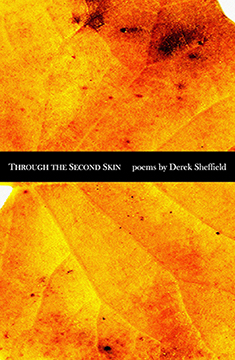 |
Comment on this
article

Through the Second Skin
by Derek Sheffield
95 pages/The book contains 42 poems
Price: $21.95
Publisher: Orchises Press
ISBN: 978-1-932535-28-0
Reviewed by David D. Horowitz
The poems in Through the Second Skin, Derek Sheffield's first full-length collection, exemplify respect for wildlife and revulsion for human violence. Sheffield's typical narrator is not some latter-day Adam surveying a divinely granted Eden but a scientifically educated poet whose fascination with animals prompts him to leave them to themselves, to not disturb their space.
For example, in "How We Look," Sheffield's narrator describes a brief encounter between a group of hikers, including himself, and some marmots who seem unsure if the hikers even exist:
Upright on boulders, they are ready
to tumble at the shrill signal
if we become, in a blink,
by sneeze or shuffle, believable.
The encounter ends quickly and without incident, and the hikers
...turn and labor
down the moraine, switch-
backing like mules silently spaced
in the falling snow.
While we drive our miles
and climb to bright rooms, they settle
below in a general huddle,
slowing for their long dream.
Eventually, the hikers "weave and are gone." Elsewhere in the collection, Sheffield revisits similar scenes. In "Between Highway 2 and the Wenatchee," the narrator inwardly recoils when a man he meets in the wilderness suggests he could kill two bears, "one for each side of the mountains." In "Near Wild Grasses," the narrator ambivalently considers the fate of a rattlesnake killed by a local, "Heinz," when the rattler seemed to mind its own business rather than threaten anyone. In "Aubade," the narrator carries an injured sparrow "like an egg" and then, hoping for its unlikely recovery, releases the bird "in brief revival back to the woods." Then, slipping into bed next to his sleeping wife, he confides
and all I hear, and all I want to hear,
is breath after breath.
Sheffield emphasizes similar themes in "Ornithology 101." Here the narrator acknowledges a student might get an "A" in "Ornithology 101" by dissecting and analyzing birds. A deeper student of nature, though, would learn to respect birds' capacity for emotion and suffering: "You expect/from every American goldfinch thistles/and sadness." Compassion for animals, then, informs and co-exists with compassion for people.
Indeed, Sheffield's respect for wildlife intersects with his understanding of human ethics and parental role-modeling. In "Near Wild Grasses," the narrator worries over the appropriate balance between protectiveness of a young girl possibly in the path of a rattlesnake and respect for the wildlife that most likely intends no conscious harm to her. After telling a woman about a rattler in the vicinity of her playing daughter, the narrator watches uneasily as neighbor "Heinz" kills the rattler. The narrator conveys vaguely complex emotions: some shame, as if he'd betrayed the rattlesnake to win approval as a good-guy neighbor and appropriately protective male, mixed with concern for what kind of parent he himself is becoming.
It is no accident Sheffield places his poems in the rural American West. He lives there, was raised there, and knows both its physical and psychological terrain. "They never rode into any sunsets," he says of cowboys in "A Revised Account of the West," and in "The Accretions" the narrator recalls his youthful fascination playing with plastic toy soldiers, only to soon learn US troops in Vietnam were "making of their lives/black stems, red blossoms." How easily popular culture's exaltation of military accomplishments might contribute to tragic bloodshed.
Yet, for all of Sheffield's reservations about popular culture's myths, his poems reflect a persistent fascination with that same popular culture. "Remember the Incredible" alludes favorably to the classic sci-fi film The Incredible Shrinking Man; other poems reference fondly or humorously items as diverse as a Suzuki DS 100 motorcycle and clothing at Mountain Sports. I like this element in Sheffield's work. It distinguishes him from all too many village scolds who lecture everyone about greed and evil while forgetting their own complex, flawed humanity. Sheffield communicates environmentally responsible ideals and gentler male role modeling without undue preachment.
Also distinguishing Derek Sheffield's work is his subtle commitment to form. Sheffield only occasionally writes in rhyme and meter or in traditional received forms, but he understands how pattern helps influence mood and rhythm. The stanzas of "How We Look" zigzag like the path of the hikers he describes. In "Remember the Incredible" Sheffield masterfully diminishes and then lengthens the lines to reflect the incredible shrinking man's evolution. Numerous other poems in this collection reflect Sheffield's thoughtfully idiosyncratic patterning, which enrich themes and narratives. And his vivid descriptions, unexpected diction, and genius for alliterative phrasing make Through the Second Skin a must-have for every Northwest poetry lover. Who could resist alliterative lines like "warbling/without a smudge of weariness" or "no feather boa/slid from a slender neck" or "the spikes of a silent explosion" or "the rattler writhes/like boiled water, like leaves/in a thrashing gust"? Such acute detail complements his poems' poignancy and gentler voices to convey a more complete poetic personality.
Derek Sheffield's fine first full collection, Through the Second Skin, proves rural Washington state need not be at our country's cultural margins but along its cutting edge.
Return to:
|


